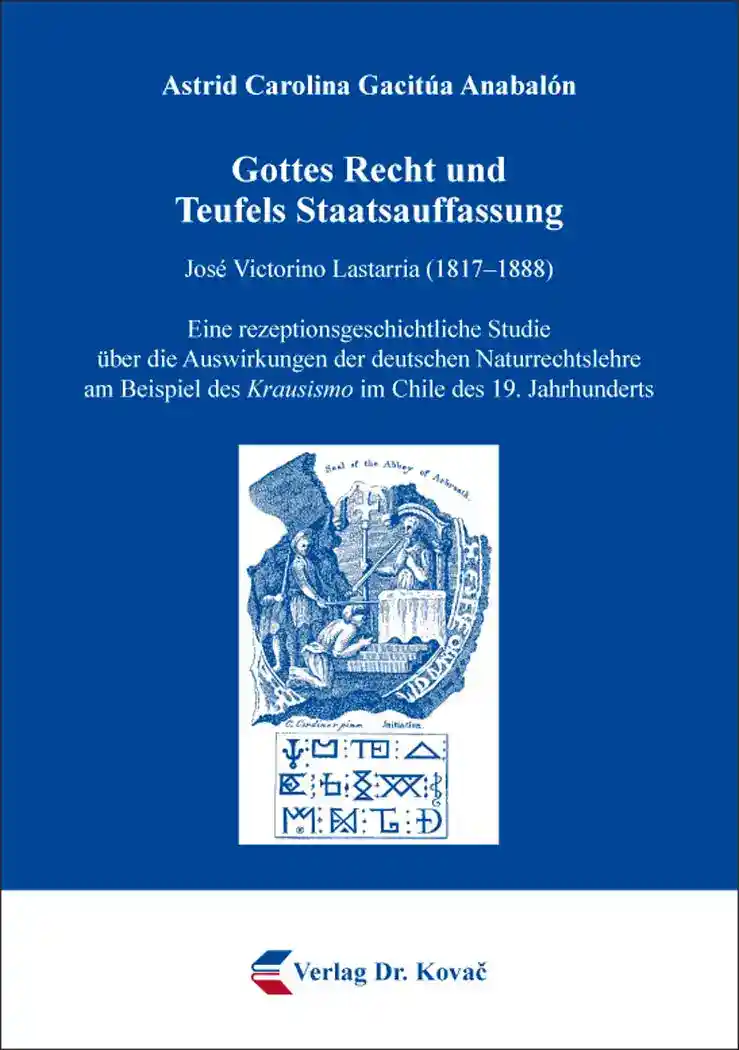Astrid Carolina Gacitúa AnabalónGottes Recht und Teufels Staatsauffassung
José Victorino Lastarria (1817–1888). Eine rezeptionsgeschichtliche Studie über die Auswirkungen der deutschen Naturrechtslehre am Beispiel des Krausismo im Chile des 19. Jahrhunderts
Schriften zur Rechts- und Staatsphilosophie, volume 22
Hamburg 2017, 360 pages
ISBN 978-3-8300-9354-1 (print) |ISBN 978-3-339-09354-7 (eBook)
About this book deutschenglishespañol
Krausismo was virtually unknown in the philosophy of German circles in the 20th century. Nevertheless, the system developed by the German philosopher Karl Christian Friedrich Krause (1781–1832) had a huge influence on the liberal masonic movement against the restauration of the absolutism in the Spanish American world during the second half of the 19th century. The main focus of the present investigation, as suggested by Karlfried Gründer (1928–2011), was basically to find a philosophical justification for such a large reception, diffusion and influence of Krausismo, especially in the areas of natural law, pedagogy and sociology, considering the fact that Krause is one of the least important representative philosophers of the German idealism.
Krausismo also influenced the instantiation of institutions in the frame of modernity, as it was the case of the erection of the „Institución de Libre Enseñanza“ (Madrid, 1876). On the other hand, a disciple of Krause, Heinrich Ahrens (1808–1874), achieved a sustainable development and a worldwide propagation of Krause’s' doctrine of Natural law. This is connected with the late scholastic Tradition of Thomas Aquinas in his protestant development. In a political way, Krausismo had a manifestation during the period of the „Trienio Liberal“ (1820–23) in Spain and during the National Assembly in Frankfurt (Paulskirche 1848–49). The main goal was to break down the absolutisms structures in order to create the basis for the development of a rule of law and a constitutional state. In this sense, the Krausismo had also guided the transition from „Estado Colonial Indiano“ to „Estado Docente“ or „Estado Tutor“ (Tutor State). As a constitutional movement, it promoted the lay state and the secularism of morality. This investigation presents the influence Krausismo had in Chile from the theoretical perspective of José Victorino Lastarria (1817–1888), one of the most important member of the liberal literary movement „Generación del 42“.
Keywords
19. JahrhundertChileEstado IndianoFreimaurerGottHeinrich AhrensJosé Victorino LastarriaKarl Christian Friedrich KrauseKrausismoLateinamerikaLiberalismusNation BuildingNaturrechtRechtsgeschichteRechtsphilosophieStaatliche SouveränitätTeufelIhr Werk im Verlag Dr. Kovač

Möchten Sie Ihre wissenschaftliche Arbeit publizieren? Erfahren Sie mehr über unsere günstigen Konditionen und unseren Service für Autorinnen und Autoren.
